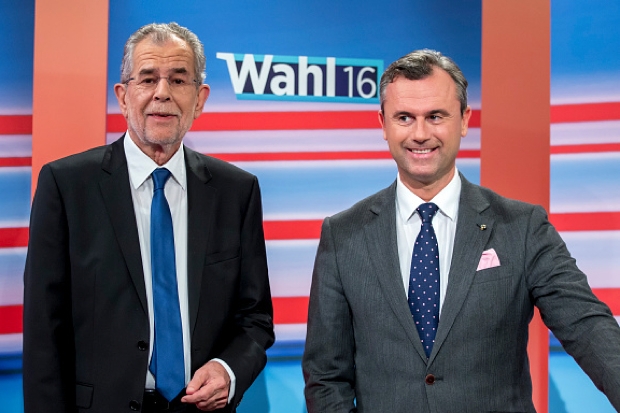So Austria has a new leader. The radical leftist Alexander Van der Bellen, a former Green party leader running as an independent, has just edged out radical right-wing politician Norbert Hofer in one of the closest elections in European history. After postal votes were counted, Van der Bellen had 50.2 per cent and Hofer 49.8 per cent – a margin of just 0.4 percentage points.
Most of the continent will probably breath a sigh of relief while still being disturbed at the size of the radical right vote; more shocking, perhaps, is the fact that among the working-class, there was almost unanimous support for Hofer, with the Freedom Party receiving 86 per cent of votes from workers. And bear in mind that in the first round of elections the centre-left got just 10 per cent of that demographic, compared to 72 per cent for the populist right.
That’s a striking statistic. What’s even more striking is the similarity the Austrian election has with the British political outlook. Yesterday’s election took place as Jon Cruddas warned back here in the UK that Labour was becoming ‘irrelevant to the majority of working people’ because of its stance on immigration. This follows Jamie Reed, MP for Copeland who, in a recent book of essays, suggested that Labour ‘will face in northern towns and villages the same fate as the Democrats in the US south: a failure to connect “culturally” with a socially conservative working-class electorate, increasingly willing to vote against their own material interests’.
And last month Frank Field said that Labour’s decision to back remaining in the EU could be ‘the second-longest suicide note in Labour’s history’, as the party will continue to lose core voters to Ukip. The Birkenhead MP said that support for the EU, which was overwhelming in the parliamentary party, was far weaker among Labour supporters, 40 per cent of whom supported Brexit. (That figure seems a bit high to me, but eurosceptics certainly account for a significant, large minority of their voters.)
To be fair to Labour, the drift of the working-class vote away from centre-left parties seems to be a Europe-wide phenomenon, if not a worldwide one. It may just be an inevitable part of a trend, whereby the main political divide of the 21st century is no longer between socialism and capitalism, or even liberalism and conservatism, but internationalism and localism.
Our political system dates from the industrial age, when in most countries two blocs arose, one representing the interests of a large and powerful (and potentially dangerous) industrial working class; the other a vague coalition of establishment supporters and anti-revolutionaries, liberals and conservatives, and the middle and upper class, who worked together to prevent democratic socialism or something worse taking power; there were various exceptions but it holds true as a generalisation.
This division broadly existed in all democratic countries until the late 20th century, when two big developments (among others) began to make it obsolete: the erosion of industrial jobs in the first world, combined with the brightest working-class kids joining the middle; and mass migration to the West. Both were in their own way linked to globalisation. We now live in the digital age, and there is no powerful working class to fear. (I still see the stickers calling for revolution around town, occasionally stuck to my local Waitrose, but the crowds there suggest it’s not happening any time soon.)
Instead the more logical division now is between the global and parochial. Most of the major issues of the day can be viewed just as easily through the local-global prism as through the left-right one. So on the one hand most younger university educated people in the West are on the ‘left’, by which is meant they are supportive of progressive causes such as gay marriage, racial justice or open borders. These are the prestige, high-status beliefs of the day, just as Catholic Christianity or Anglicanism once were, and they form the philosophical core of centre-left parties in the West. Running through this prestige faith like Blackpool rock is internationalism, and an aversion to anything inward looking. Centre-left parties reflect this worldview.
Their natural opponents are not conservatives or socialists but localists – people who believe in prioritising those with whom we have most in common, usually compatriots, and who in Europe are increasingly represented by the radical right. Native working-class voters, who are most adversely affected by globalisation, are much more logically part of this latter, parochial party (besides which, mobility has always correlated with social class).
It therefore makes sense that in Europe and America, right-wing parties are taking working-class votes. At the same time the pro-global parties increasingly rely on the support of minorities, which on this side of the Atlantic means notionally leftist politics taking on some exciting and vibrant new multicultural ideas.
It also means that Brexit could prove potentially more divisive in Labour ranks than among the Tories, since a lot of Tory Brexiteers are fairly global-minded, and want more free trade with the rest of the world. The actual ideological division among Labour voters is probably deeper.
Free trade is overall a good thing for humanity, and trade liberalisation has brought millions upon millions of people around the world out of poverty. But in America, for one, it has certainly damaged the economic prospects of working-class whites. These people are the core movement behind Donald Trump, the face of parochialism in 2016. This is why so much of their anger is directed at globalisation generally and the people seen as responsible for it, even if their saviour doesn’t have any answers to it, and will ultimately leave their hopes and dreams disappointed.
Yet the centre-left has abandoned these people, and has instead become an alliance of rich liberals and minorities. In Europe the same thing is happening, as centre-left parties continue to lose the support of their traditional base. Austria’s result shows what happens when workers feel abandoned by the parties that traditionally used to represent them. Will the last working-class centre-left voter in Europe switch off the light?

Should Britain Leave the EU?
The Spectator returns with a second Brexit debate on Tuesday 14 June at Westminster’s Emmanuel Centre. As the referendum date looms closer, the polls are neck and neck and tensions are running high. As the campaign enters its final stages, join Andrew Neil for a debate with leading voices from the Leave and Remain camps. Hear from speakers including Suzanne Evans of Ukip, Conservative MEP Daniel Hannan and former Conservative foreign secretary, Sir Malcolm Rifkind. For more information and to book tickets, click here.







Comments